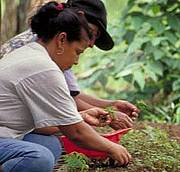Business reliance on ecosystems
15 September 2012 | Article
As businesses linked to agriculture depend heavily on ecosystems for their source materials, it is increasingly recognized that ecosystem stewardship is an important part of securing their supply chains.
Several examples of integrating stewardship projects were discussed during a workshop at the 2012 IUCN World Conservation Congress with companies representing several industries sharing successes and proposing new ideas.
In the tobacco sector, a tool was developed to measure ecosystem services in a holistic way to reduce the impact on landscapes from intensive cultivation. The tool takes into account the different factors including farmers, NGOs and governments.
An agro-chemical company gave an example of using ecosystem stewardship to secure its business. Its approach is based on optimizing productivity to reduce the cultivation space and allowing the extension of new natural areas for biodiversity.
A consumer package goods company described a project in Brazil with the Institute for Protection of Environment (IPE) involving yoghurt production where a high-tech measurement system was developed to measure water and soil use.
Nespresso’s AAA sustainable quality approach works with the Rainforest Alliance, farmers and local agronomists to integrate biodiversity criteria into farm management. The work focuses on areas like water management, reforestation, shade management and wildlife protection.
When asked about the challenges of working on dependencies and ecosystem services, the companies shared similar views: Convincing farmers and producers to change their practices; ensuring consumers, society, farmers, company directors, NGOs all have a better understanding of environmental services, and reducing the number of conservation standards and methods for assessing ecosystems to avoid confusion.
The need to ensure there is appropriate government policy and support to create an environment for stakeholders to collaborate and improve efficiency was also raised as well as equipping local communities with the tools and technology.
Vertical integration, or ensuring all parties in a supply chain are working together, can help reluctant producers to implement sustainability practices. There is also a need to assess the value of ecosystem services at scale, using timelines that are relevant for making business decisions.
Businesses agreed that reducing ecosystem impact is a major challenge that cannot be managed alone. There is a need to build a common and unified tool to evaluate impacts and dependencies, and integrate governments, NGOs, communities and companies.



